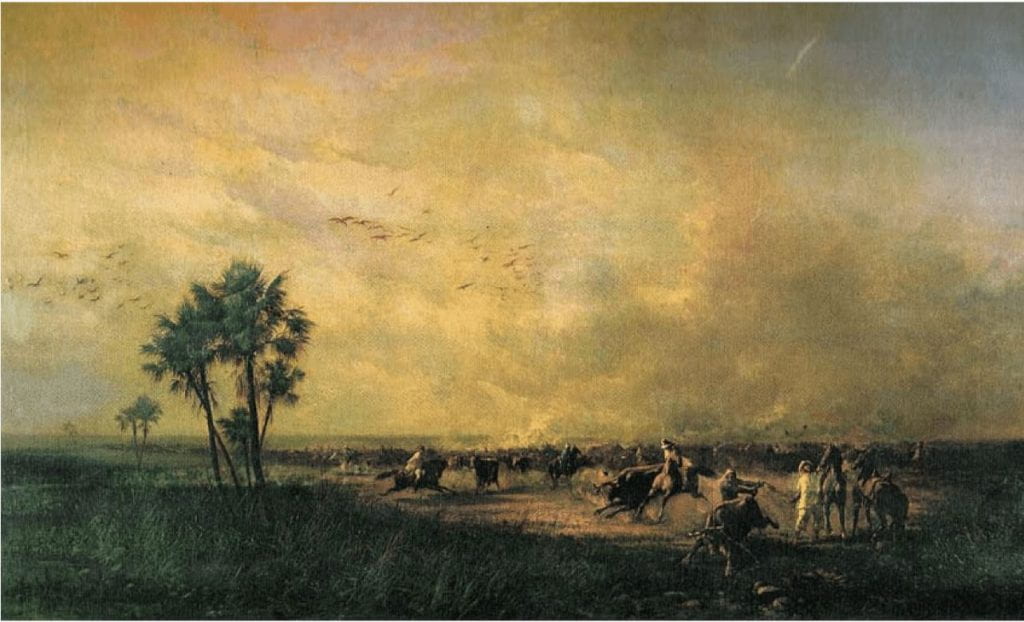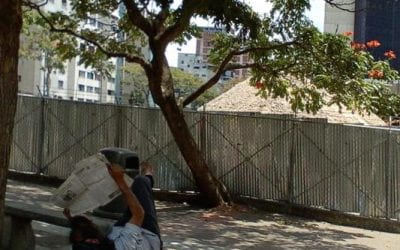Postales de Leningrado
A Scene from New Venezuelan Film
The 2007 Venezuelan film “Postales de Leningrado”—postcards from Leningrad—mingles history and politics to pose a question about identity—the identity of the children of those men and women who opted to join the guerrilla struggle in Venezuela in the mid-20th century, just when the nation was trying to reestablish democracy after the Marcos Pérez Jiménez dictatorship (1952-1958). Venezuelan film director Mariana Rondón’s full-length feature won the Grand Prize El Abrazo for best film in Festival de Biarritz last year.
Postales de Leningrado portrays the history of a young woman guerrilla who, as a subversive in the 1960s, has to give birth while she is still clandestine. However—and just by coincidence—her daughter is the first to be born on Mother’s Day in 1966; thus, the mother’s photo appears published in the newspaper. This maximum exposure contrasts with her furtive life, as parents and children while fleeing from the militia adopt an anonymous life, filled with threats and fear. The daughter is now the protagonist who narrates the tale and whose perspective testifies to events that have never really ended, but always only have been interrupted and changed. The girl’s narrative encompasses the story of their cousin Teo, as the children wait for postcards from Leningrad as proof that their parents are down from the mountains. The children take turns as protagonists in the story; in their fanciful world of games, desires, hiding places and pseudonyms, they recreate the clandestine adventures of their guerrilla parents and nurture a fantastic world of superheroes able to (con)fuse fiction and reality in a life that tries to defend itself on a daily basis from fear and death.
Rondón brings us close to a past that is not consumed with legal or moralizing grudge matches. Rather, the director demonstrates a vital fragility that freely allows the yearned after and delayed revelation of a self that, in order to survive in the midst of ideological and military confrontation, does not hesitate to disguise itself. At the beginning of the film, the girl’s first declaration is “The time of year I like the best is Carnival because when we disguise ourselves, it’s as if we were hiding, because no one can catch us. My cousin Teo, who is older than me, doesn’t like to dress up in costumes; he says that the best way not to get caught is never to tell anyone your real name. I do tell people my real name; my favorite costume is the Invisible Man, but I like to get dressed up in different costumes. The truth is that Teo likes this costume too, but he says that what he really likes is getting the postcards from Leningrad that his mom sends.” In the background, the viewers sees images of a Caracas Carnival in the 1960s. Postales de Leningrado portrays identity through fiction: to avoid the risks of being captured, the guerrillas and their children must mask themselves with one name after another; the children dream of the furtive heroics of a man-frog and the invisible man, longing to encounter their parents again in Leningrad—a place dreamed about by Teo, a filmlike space desired and materialized by Rondón. These fictions evoke—they make return—an absence: that of the always postponed family life, that of a childhood that wishes to explain itself in order to put together the pieces of vital history.
Postales de Leningrado indeed offers us the autobiographic and family history of Mariana Rondón; the film is a way to share and experience, from this vantage point, the narrative scenes established through a historic and fair communitarian sense prioritize—beyond fear and threats—the question of identity, a question about the forms of discourse that we construct not only when we give ourselves a name, but also seek out a place within the social space. In its aesthetic and multiple dialogues, the film clearly demonstrates possibility of affirming life: fear and risk; fantasy and heroism; violence and death, story and image. in the middle of anonymity, the childish imaginary world and the pop aesthetic of the 1960s, the film through a language of borders and narrative flashbacks in an “artesanal form of communication,” as Walter Benjamin would put it, between fiction, documentary and reality, between the the comic and the devastated, between photography and pictorial intervention, but also between rationality and craziness, between commitment and betrayal, between life and death, city and mountain, , Rondón’s film tells us, altogether, that this heterogeneity—the heterogeneity of life itself—makes up the name, the identity, that it is not only a way of being, but a way of knowing fragmented in the past, present and also in the future, thus the interrupted, uneven and interwoven storytelling of the girl who at once narrates and testifies to history.
The search for and use of multiple expressions of media thus becomes a clear resource for knowledge and self-knowledge; the girl narrator intervenes and manipulates the film image and, in this way, operates on the very act of narration and its possibility of creating identities, all of which inscribes an exercise of individual and collective responsibility capable of reconstructing historical memory. The past constitutes a legacy with which the children must dialogue and confront, but this past is anchored in the present and concentrates, without a doubt, in a question of identity not so much to demand an answer or express a doubt, but to confirm what is said and done. Postales de Leningrado is without a doubt a place where naming takes place, far beyond anonymity, uprooting, and disappearance; it safeguards the self in history….that other history.
Postales de Leningrado Porque ya no Desean Permanecer en el Anonimato
Una Escena de Nuevo Cine Venezolano
Por Jeffrey Cedeño
Ficha Técnica
Año: 2007
País: Venezuela
Dirección y guión: Mariana Rondón.
Producción y montaje: Marité Ugás.
Fotografía: Micaela Cajahuaringa.
Animación y gráficas: Ignacio Gorfilkiel.
Dirección de arte: Matías Tikas.
Sonido: Lena Esquenazi, Rosa María Oliart.
Música: Felipe Pérez Santiago, Camilo Froideval.
Elenco: Laureano Olivárez (Teo), Greisy Mena (Marcela), William Cifuentes (Teo niño), Haydée Faverola (abuela), María Fernanda Ferro (Marta).
Duración: 93 minutos.
35 mm con intermedio digital, 1,85:1, color, Dolby Digital.
“Cuánto debe costar a nuestro pensamiento habitual una concepción de la historia que evite toda complicidad con aquella a la que los políticos continúan ateniéndose”, nos dice Walter Benjamín desde 1940, en una de sus Tesis sobre la filosofía de la Historia. Se trata, ciertamente, de un impulso por trazar alternativas, pero también de una franca interrogación por la política y la historia en el seno de nuestras vidas… Y hoy pocos advierten que es en el amplio espectro de la vida donde la política adquiere sus sentidos. “Postales de Leningrado” (2007), de la directora venezolana Mariana Rondón, y ganadora del Gran Premio El Abrazo a la Mejor Película en el Festival de Biarritz 2007, se recorta sobre tales dimensiones—la historia y la política—para erigir una pregunta sobre la identidad… la identidad de los hijos de aquéllos hombres y mujeres que optaron por la lucha guerrillera en la Venezuela de mediados del siglo XX, justo cuando la nación entera intentaba retomar el orden democrático luego de la dictadura de Marcos Pérez Jiménez (1952-1958).
Postales de Leningrado retrata la historia de una joven guerrillera que, debido a su condición de subversiva en la Venezuela de los años sesenta, no tenía otra opción que dar a luz en la clandestinidad. Sin embargo, y casualmente, su hija es la primera en nacer el día de la madre de 1966, por lo tanto, su fotografía aparece publicada en la prensa. Esta máxima exposición erige un contrapunto con una vida furtiva, pues tanto padres e hijos al huir de la persecución de las milicias, inician una historia anónima, colmada de amenazas y miedos. Y es precisamente la niña quien narra y desde cuya mirada atestigua los sucesos nunca completos, siempre interrumpidos y cambiantes hasta alcanzar, también, la historia de su primo Teo, quien espera postales de Leningrado como una prueba de que sus padres se encuentran más allá de las montañas. Los niños se tornan entonces en los protagonistas de la historia, pues en medio de disfraces, juegos, recreaciones, deseos, escondites y nombres falsos, reinventan las aventuras de sus padres guerrilleros, y, de este modo, erigen un mundo fantástico de superhéroes capaz de (con)fundir ficción y realidad. Surge al punto una vida cotidiana, una vida de todos los días que intenta defenderse del miedo y la muerte.
El acercamiento al pasado que nos ofrece Rondón no se consume en un ajuste de cuentas, jurídico o moralizante. No. La Directora exhibe una fragilidad vital que deja salir sin trabas la ansiada y postergada revelación de un yo que, para sobrevivir en medio del enfrentamiento ideológico y militar, no duda en disfrazarse: “La época que más me gusta es el carnaval, porque cuando nos disfrazamos es como si nos escondiéramos, porque nadie nos puede atrapar. A mi primo Teo, como es más grande, no le gusta disfrazarse, él dice que lo mejor para que no te atrapen es que nunca digas tu nombre de verdad. A mí sí me gusta disfrazarme y mi disfraz preferido es el Hombre invisible. La verdad es que a Teo le gusta ese disfraz, pero lo que más le gusta a él, es recibir postales de Leningrado que le manda su mamá”, es la primera frase que enuncia en off la niña narradora del filme tras las imágenes de un carnaval de Caracas en los años sesenta. En conjunto, la identidad que logra erigir y develar Postales de Leningrado alcanza su presencia mediante la ficción: para evadir los riesgos de captura, los guerrilleros y sus hijos deben enmascararse con un nombre tras otro, los niños sueñan con las heroicidades furtivas del hombre-rana y el hombre invisible y también anhelan reencontrarse con sus padres en Leningrado—un lugar soñado por Teo, un espacio fílmico deseado y materializado por Rondón. Y estas ficciones evocan—hacen volver—una ausencia: la de una vida familiar siempre postergada, la de una niñez que desea mostrarse para rearmar una historia vital.
Postales de Leningrado nos ofrece, sí, la historia autobiográfica y familiar de Mariana Rondón… se trata entonces de compartir una experiencia, de allí la escenificación del contar y de la narración siempre tras un sentido histórico y comunitario justo cuando el filme jerarquiza—incluso más allá del miedo y la amenaza—la pregunta por la identidad… una pregunta por las formas del discurso que construimos al darnos no sólo un nombre, también un lugar dentro del espacio social… y el filme encuentra en la estética (y en sus múltiples diálogos) una posibilidad certera para afirmar la vida: el miedo y el riesgo, la fantasía y el heroísmo, la violencia y la muerte, el contar y la imagen. En medio del anonimato, la imaginería infantil y la estética pop de los años sesenta, la película trama un lenguaje de fronteras y recortes propia de la narración en tanto “forma artesanal de la comunicación”, como diría Walter Benjamin… entre la ficción, el documental y la realidad, entre el cómic y el rasgado, la fotografía y la intervención pictórica, pero también entre la racionalidad y la locura, entre el compromiso y la delación, entre la vida y la muerte, la ciudad y la montaña, el filme de Rondón nos dice, en conjunto, que en esa heterogeneidad—la de la vida—acontece el nombre, la identidad… no es sólo una manera de ser, sino también de saber trizada en el pasado, el presente y, también, en el futuro…de allí la narración entrecruzada, intercalada e interrumpida de la niña que narra y atestigua la historia…
La búsqueda y utilización de múltiples medios expresivos se torna un entonces en un claro recurso de conocimiento y reconocimiento—la niña que narra interviene y manipula la imagen fílmica y, de este modo, opera sobre el acto de narrar y sus posibilidades identitarias—todo lo cual inscribe un ejercicio de responsabilidad individual y colectiva capaz de reconstruir la memoria histórica. El pasado constituye una herencia con la que los niños deben dialogar y enfrentarse, pero ese pasado se ancla en el presente y concentra, sin duda, una pregunta por la identidad no tanto para demandar una respuesta o expresar una duda, sino para afirmar lo que se dice y se hace… Postales de Leningrado es, sin duda, el espacio donde acontece el nombre… y más allá del anonimato y del desarraigo y la desaparición… aguarda, sí, el yo, la historia… una historia otra.
Jeffrey Cedeño is Professor in the Department of Languages and Literatures in the Universidad Simón Bolívar in Caracas. He has published several articles on literature and Latin American culture in specialized magazines in Latin America, the United States and Europe, including “Venezuela in the Twenty-first Century: ‘New Men, New Ideals, New Procedures?'” Journal of Latin American Cultural Studies (March, 2006).
Jeffrey Cedeño es un professor en el Departamento de Idiomas y Literaturas en la Universidad Simón Bolívar en Caracas. Ha publicado varios artículos en literatura y la cultura Latinoamericana en revistas especializadas en América Latina, los Estados Unidos, y Europa, incluso “Venezuela in the Twenty-first Century: ‘New Men, New Ideals, New Procedures?'” Journal of Latin American Cultural Studies (March, 2006).
Related Articles
Editor’s Letter: Venezuela
Long, long ago before I ever saw the skyscrapers of Caracas, long before I ever fished for cachama in Barinas with Pedro and Aída, long before I ever dreamed of ReVista, let alone an issue on Venezuela, I heard a song.
Elections and Political Power: Challenges for the Opposition
English + Español
Next month’s elections will be an important benchmark in Venezuelan politics. On November 23, voters will go to the polls to elect 22 state governors and 355 mayors in as many municipalities, as well as choose the mayor of Caracas. The elections are taking place in a political environment influenced by the abrupt proclamation of 26 laws on July 31, the last day of President Chávez’s 18-month powers to issue emergency decrees …
A Review of Tramas del mercado: imaginación económica, cultura pública y literatura en el Chile de fines del siglo veinte
Luis Cárcamo-Huechante’s new book provides us with a convincing counter-narrative, at once nuanced and succinct, to three mainstream narratives of the neoliberal free market in Chile: those of monetarist economics, promotional politics, and literary bestsellers. It covers the Pinochet dictatorship (1973-90) and the transition to democracy from its official inauguration in 1988, with the victory of the Yes vote for a return in two years’…





